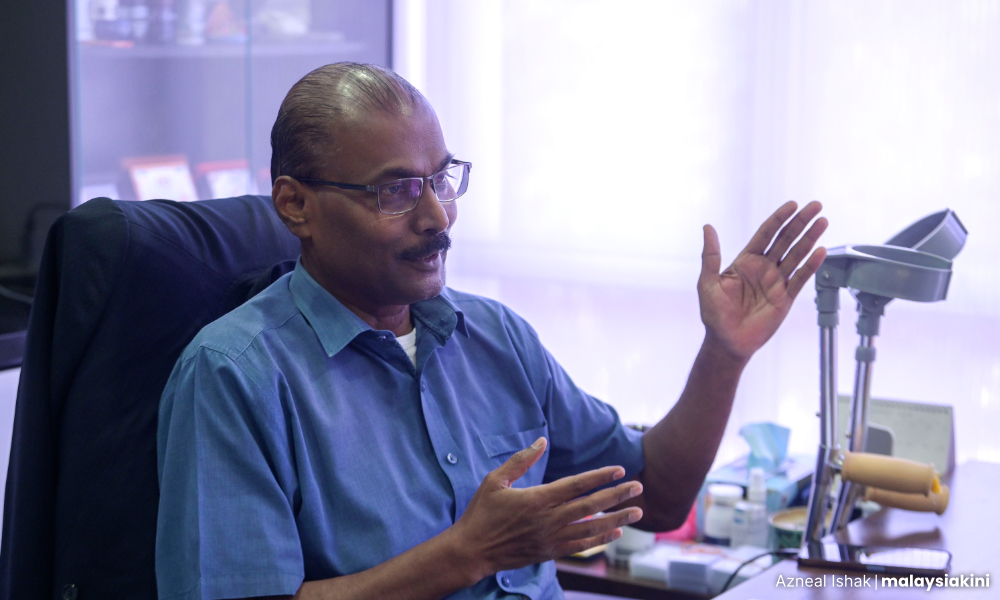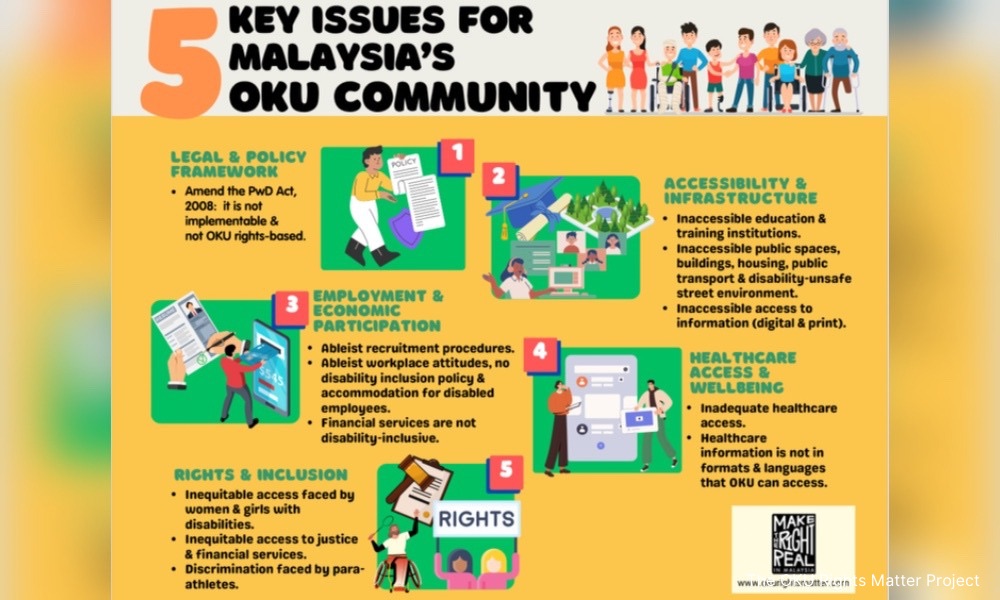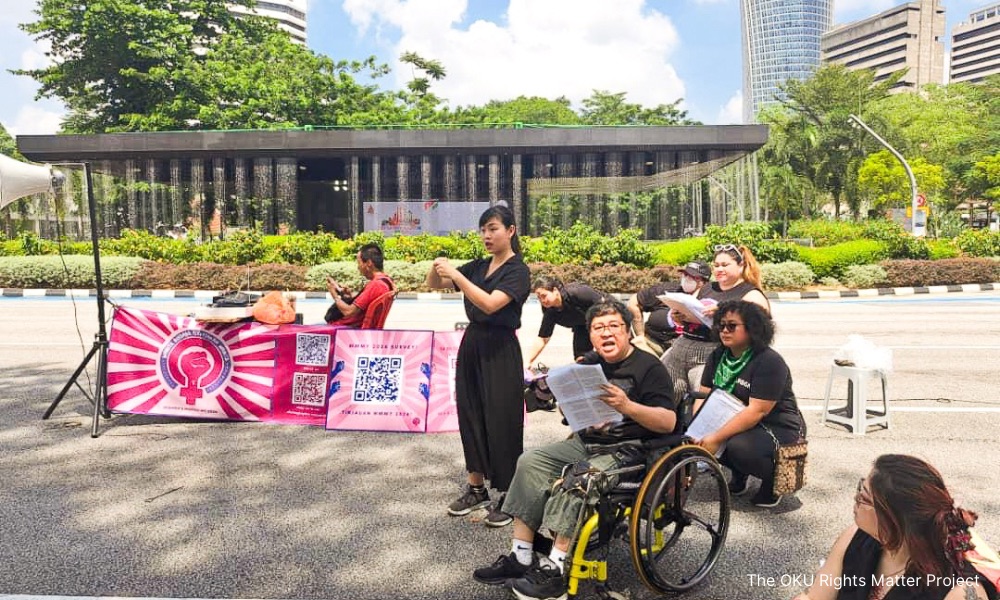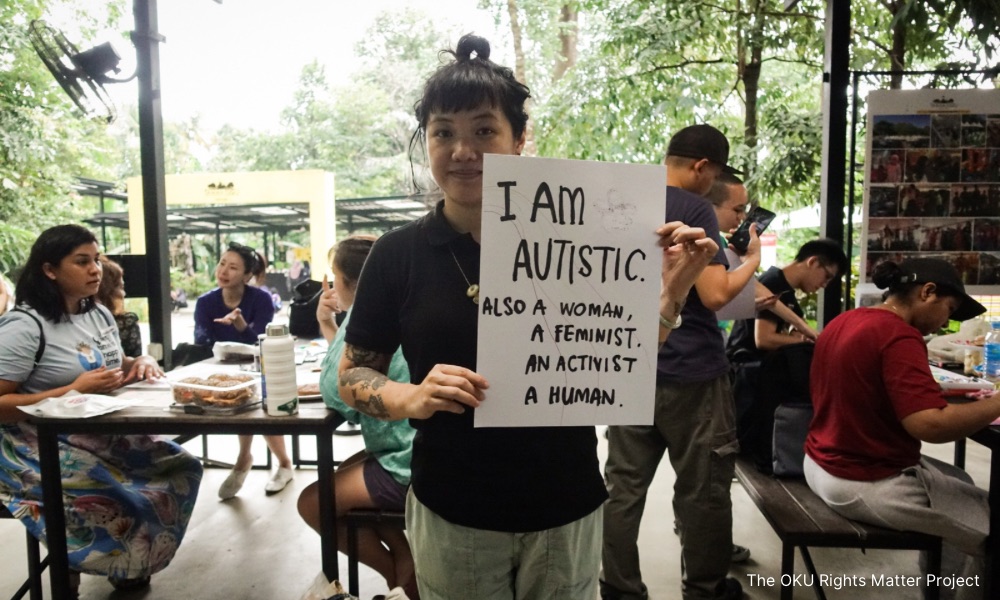Senator Isaiah Jacob,
We, members of the disabled community who include disability advocates, disability rights activists, care partners and allies, are profoundly disappointed by your recent remarks and stance in a profile interview with Malaysiakini published on April 22 - that was raised, on May 1, for the attention of the disabled community.
Our voices reflect the diversity of our lived disabled experiences and insights. Among us are individuals with expertise in research, advocacy, training, and policy development in sectors ranging from law, human rights, media, community building, self-empowerment, education, healthcare, and public health, to gender equality, information and communications technology, the arts and beyond.
This is an open letter on our collective thoughts in response to issues and views that you expressed from your formal position as a senator in our Dewan Negara, mandated to represent the voices of the disabled community, not about you as an individual.
Your persistent advocacy for the term “specially abled” is a poor use of the upper house position that you occupy.
A disability rights advocate and parent to a disabled child said this:
“As a senator what has he done so far for the community besides talking about terminology since day one? It does not change the fact that my son cannot attend school or get a job later.
“What are the real rights of OKU in Malaysia? I plead that the senator do more than just continuously voicing what term to label my child when we have already widely and legally adopted orang kurang upaya.
“This is dividing us, instead of uniting us to move forward together.”
The terms "disabled”, “persons with disabilities” or “orang kurang upaya” are widely used following consultations between the community and the government. On June 26, 2023, three months after you were appointed as a senator, five disabled community members met with you and handed you a letter on the use of respectful and appropriate disability language.
The letter had over 100 signatories with representation from more than 70 organisations. We had hoped that you would accept our substantive support for the meaningful fulfilment of your Dewan Negara mandate.

We remind you that the United Nations Disability-Inclusive Language Guidelines itself states that:
“The term ‘special’ used in relation to persons with disabilities is commonly rejected, as it is considered offensive and condescending because it euphemistically stigmatises that which is different.”
Preferred terms
The disability community and care partners internationally and in Malaysia have long moved away from the use of negative terms. “OKU” and “persons with disabilities” or disabled persons (by those who wish to reclaim their disability identity) are the preferred and community-accepted terms.
We are truly perplexed by the senator’s persistent countering of United Nations-endorsed terminology accepted internationally and contained in Malaysia’s Persons with Disabilities Act 2008.
Surely, energy and resources ought to be expended on more critical disabled rights issues, instead of dividing the community and diverting attention from core issues.
This promotion of the euphemism (“specially abled”) devalues our community’s struggles and disregards the real challenges the disabled face. It shifts the focus away from responsibility for societal change urgently needed for equitable inclusion of the disabled in all aspects of life.
We urge you to move beyond sugar-coated labels for our community. Please stop undoing the enormous work of the disabled community and the efforts of your predecessors.
The disabled community needs a representative leader who is open to understanding the community in the context of international and domestic rights frameworks for the disabled, as a basis for facilitating the resolution of its issues and uniting us in the process.

How are the rights of the disabled advanced by using the media to express to the public your perception of the community’s “lackings” when it is your mandate to bridge community-government collaboration?
You also highlighted “too many groups and societies claiming to represent the community” as a basis for the government to “ignore us, claiming we are not united and it’s too difficult to come to an agreement on what is needed.”
What you perceive as a threat are responses to many unmet needs within our community with all its diversities and historical neglect by those in power.
Rather than disparaging the disabled community for this, we urge you to engage with us meaningfully, to understand the breadth and depth of our experiences.
“The OKU community would like you to be on the correct path. And, that path is to work together with us meaningfully. If you do not heed the voices of the grassroots and civil society organisation leaders of the OKU community, you are effectively abusing your position to undo all the hard work and sacrifices of OKU activists - who mostly get neither credit nor compensation for the enormous labour that we give for advancing OKU rights.” - a deaf activist
Lack of meaningful action
Your tenure has passed the halfway mark. Following your April 3, 2023 debut in Parliament, marked by all joining you in your “one minute standing on one leg” invitation, your term of office thus far has been marked by a disheartening lack of meaningful action.
We urge you to seize the opportunity of your tenure: call for affirmative and substantive actions for proactive and concrete reforms. Drop symbolic gestures for photo opportunities.

Rights advocacy for the disabled is not about superficial stunts or the deceptive comfort of euphemisms. For the common good and advancement of our community, such advocacy has to focus on the harsh realities of discrimination and systemic denial of our rights.
It is time that the rakyat, including the disabled community, call for an audit of all government-appointed representatives of the disabled community and public office holders, to measure the impact of their terms of office on strengthening gender-equal, ageing-sensitive disability inclusion in laws and policies and meeting priority disabled community needs.
In your case, Senator Isaiah Jacob, please revert to the disabled community on the five points below, as a basis for initiating multi-ministerial collaboration for disability inclusion:
What has been accomplished in the first year of your tenure?
Which disability organisations and activists have you actively and meaningfully engaged with?
Which working groups and conferences have you attended to understand our needs (beyond officiating our community events for photo ops)?
Where do we find accessible versions of your plans for the disabled community?
How are you helping with Malaysia’s first report (due in 2012) on the Convention on the Rights of Persons with Disabilities that Malaysia ratified?
A growing community
Malaysia’s disabled community constitutes 16 percent of the population. And, it is growing, especially with the rapidly ageing society, the rise of chronic diseases, and increasing mental health issues. Among Malaysians aged 60 and beyond, 50.8 percent have functional difficulties: vision, hearing, memory and mobility issues.

The community cannot afford to be sidelined by ineffective leadership and poor representation. We do not want our community to be represented by a disabled person who only talks of change.
To effectively represent the community, it is essential to gain a nuanced understanding of disability-gender-ageing linkages.
Our community deserves a disabled senator who invests in understanding the historical evolution of disability rights internationally and domestically. The senator has to be one of us who labours shoulder-to-shoulder with us to make the right deal.
We applaud your record of activism against injustice and for environmental protection, with participation in protests, including interstate walking and hunger strikes. We are proud when a member of our disabled community engages in mainstream activism for Malaysia.
Like you, we too are disabled. Many of us have experienced journeys similar to yours. We understand your pain. But, times have changed. Our understanding of disability and the advancement of human rights has moved forward.
We must recognise that ableism is deeply embedded in our society and our community. We need to examine this within ourselves - is it the label of “orang kurang upaya” that pains us or is it the stigma attached to the label that is the painful thorn?
The disabled community, and those who claim leadership over it, must be courageous. We must be willing to listen beyond our personal pain, for us to claim our rightful place in society, not living in the shadows of non-disabled persons, and ever trying to be “normal.”
We call for senatorial leadership that is empathetic, inclusive and decisive - one that not only values but also amplifies the diverse voices of the disabled community, recognising our challenges and enabling us to build on our strengths.
The senator for the disabled community must be a leader who walks the non-ableist, non-sexist, non-ageist talk on disabled rights - a leader who strives consistently to earn the respect of the disabled community.
Can you provide the leadership that we deserve? - Mkini
THE OKU RIGHTS MATTER PROJECT seeks to help strengthen conditions for advancing disability rights, to achieve acceptance and inclusion of persons with disabilities on an equal basis with others in society.
The statement is signed by nearly 200 persons with disabilities, representatives of OKU organisations, disability organisations, parent advocates, care partners, family members and professionals in disability services and allies.
The views expressed here are those of the author/contributor and do not necessarily represent the views of MMKtT.



No comments:
Post a Comment
Note: Only a member of this blog may post a comment.